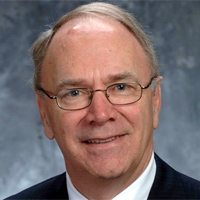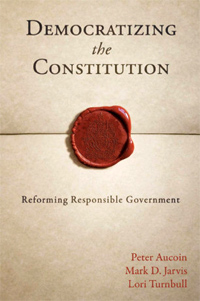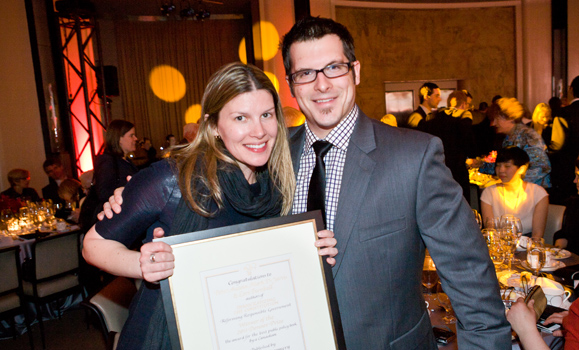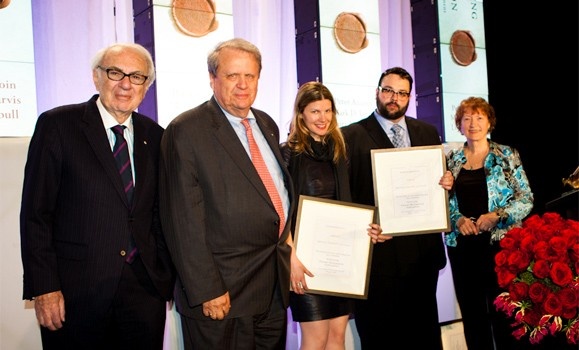Of all the places that Lori Turnbull expected her academic career to take her, a glitzy, Oscars-like award ceremony wasn’t on the list.
But there she was, seated with family and colleagues at a gala awards dinner in Toronto last week. She was there because the book she co-authored, Democratizing the Constitution: Reforming Responsible Government was one of four finalists for the Donner Prize, a $50,000 award presented each year to recognize the best public policy book by a Canadian.
“It’s not an experience I thought I’d ever have as an academic,” she says, explaining the detailed video packages that introduced each book at the ceremony. “I thought I’d have to break into a movie scene for that.”
Seated with her was co-author, Mark Jarvis, doctoral candidate at the University of Victoria. There was someone missing, though, and through the evening the weight of his absence grew heavier. And when Democratizing the Constitution was named the winner, their acceptance speech quickly became a tribute to his legacy.
“We were delighted to be shortlisted, don’t get me wrong,” says Dr. Turnbull, speaking to Dal News the Friday after the ceremony.
“But we wanted this for Peter.”
 She’s referring to Peter Aucoin, beloved şÚÁĎłÔąĎÍřpolitical science professor and renowned public policy scholar, who passed away last year at the age of 67. Dr. Aucoin is not only the third co-author on Democratizing the Constitution, but was responsible for bringing the scholars together on the project.
She’s referring to Peter Aucoin, beloved şÚÁĎłÔąĎÍřpolitical science professor and renowned public policy scholar, who passed away last year at the age of 67. Dr. Aucoin is not only the third co-author on Democratizing the Constitution, but was responsible for bringing the scholars together on the project.
Dr. Turnbull explains that the book is, in some ways, a culmination of his life’s work.
“All of the themes that really mattered to him—concentration of power, accountability, role of the House of Commons—we dealt with in this book. And things that Peter had worked on as a young scholar, like how party leaders are chosen, he came back to in this book.”
Writing down Canada's unwritten political rules
Democratizing the Constitution is also incredibly relevant in the current political landscape. At a time when many observers are asking hard questions about the role of Parliament and the concentration of power in the Prime Minister’s Office, the book makes the case for constitutional reforms that would write down the unwritten rules of Canadian politics.
“If you look at the written Constitution, it doesn’t really tell you much about how democracy works,” explains Dr. Turnbull. “The confidence convention, for example—that the prime minister and cabinet need the support of the House of Commons to govern legitimately—that’s not written in the Constitution anywhere. In fact, the prime minister isn’t even mentioned in the written Constitution.
“If you read only the written parts, it doesn’t give you much of a sense of what actually happens.”
 She points to several examples where those unwritten rules have led to complicated situations: like when Stephen Harper asked the governor general to prorogue the House in 2008 to avoid a confidence vote, or when Jean Chrétien called an early election in 2000 solely because he knew he could gain more seats.
She points to several examples where those unwritten rules have led to complicated situations: like when Stephen Harper asked the governor general to prorogue the House in 2008 to avoid a confidence vote, or when Jean Chrétien called an early election in 2000 solely because he knew he could gain more seats.
Because the rules and practices in these sorts of scenarios aren’t in the actual Constitution, they’re not legally enforceable. The only way politicians can be held to account when they overstep their bounds is through the political process.
“And that’s not enough,” says Dr. Turnbull. “Voting is too blunt an instrument to express all your political preferences. If a prime minister were to be stepping outside constitutional conventions, but he was still the person people trusted most on the economy, he’d get away with it. And the Constitution shouldn’t be whatever the prime minister gets away with it. That’s where we’re at now.”
Of course, the idea of reopening the Constitution may well send shivers up the spines of those who remember the Charlottetown and Meech Lake Accords of the late 1980s and early 1990s. And, indeed, Dr. Turnbull acknowledges that past attempts to reform the Constitution have been fraught with challenges, particularly related to provincial interests.
But given that other nations like Great Britain—on whom our Constitution is modeled—have formally written down their unwritten political rules, Dr. Turnbull says it’s high time that Canada does the same.
“If we accept the current constitutional paralysis, then we are extremely immature as a country. We’re consenting to our own democratic paralysis. We’re not governing the way we should because no one has the guts to tackle the Constitution.”
Taking action on constitutional reform
And that’s one of the reasons why Democratizing the Constitution is such a compelling book: it doesn’t just assess the current, complicated state of Canadian politics, but presents clear reforms towards improving democratic accountability.
Dr. Turnbull says that approach is straight out of Dr. Aucoin’s playbook.
“He never just identified problems; he always thought to the point where he could come to a workable solution,” she says. “This book is not just a discussion of what’s wrong with the Constitution; it frames the problem as one that can be dealt with in courses of action.”
Democratizing the Constitution is the second book by a şÚÁĎłÔąĎÍřauthor to win the Donner Prize. Brian Bow took home the 2009 prize for his book The Politics of Linkage: Power, Interdependence and Ideas in Canada-US Relations. And Frank Harvey was shortlisted for the 2004 award with Smoke & Mirrors: Globalized Terrorism and the Illusion of Multilateral Security.
But despite an incredible list of honours that included the Order of Canada, Dr. Aucoin had never won the Donner. And Dr. Turnbull says that he would have cherished the moment had he been there.
“He was so gracious, so humble and down to earth. And winning awards was totally normal for him, it happened so often, but he was still so appreciative whenever anyone would recognize his work.
“He would have enjoyed the night so much.”
 Dr. Turnbull celebrates with her brother at the Donner ceremony. (Provided photo)
Dr. Turnbull celebrates with her brother at the Donner ceremony. (Provided photo)
Ěý

